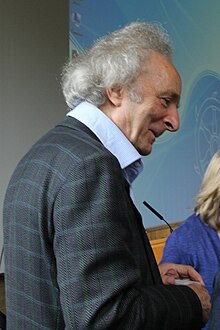
Theodore Zeldin CBE (born 22 August 1933) is a scholar and current Associate Fellow of Green-Templeton College, Oxford. He is the author of A History of French Passions, a quotidian history of the French people,[1][2] as well as An Intimate History of Humanity.[3]He is also a Fellow of St Antony's College, Oxford, having previously been its dean for 13 years, and a member of the British Academy and the Royal Society of Literature.
Theodore Zeldin was born on the slopes of Mount Carmel on 22 August 1933, the son of Russian-Jewish parents who later chose to become naturalised British subjects. His father was a civil engineer, an expert in bridge-building, a colonel in the Russian Czarist Army, and a socialist who rejected the Bolsheviks. Zeldin's mother, the daughter of an industrialist, was a dentist who completed her training in Vienna. Escaping from the Russian Civil War, Zeldin's parents emigrated to Palestine, where his father worked for the British Colonial Service building railways. He was disappointed by the failure of the movement for Arab-Jewish solidarity, which he favoured together with other scientists and intellectuals, and of which the railwaymen's trade union was a vocal advocate.[4]
Zeldin was educated at the English School Heliopolis (a coeducational boarding school) and at Aylesbury Grammar School. He graduated from Birkbeck, University of London at the age of 17, having studied philosophy, history, and Latin, and then from Christ Church College, Oxford studying modern history. He received Firsts from both, followed by a doctorate from the newly established St Antony's College in Oxford. He has been a Fellow (now Emeritus)[5] of the college since 1957 and was its dean for thirteen years, playing a lead role in developing it as the university's centre for international studies. Now, as an Associate Fellow of Green-Templeton College, Oxford, he is active in its Future of Work project.[6]
Zeldin has been elected a Fellow of the British Academy and of the Royal Society of Literature, and is a member of the European Academy. He has been decorated as a Commander of the Order of the British Empire, a Commander of the Légion d'Honneur and a Commander of the Order of Arts and Letters of France. Zelda also holds the Wolfson Prize, Britain's top award for History.
He has been married to Deirdre Wilson, the co-inventor of relevance theory, since 1975; they live in an Art Deco house outside Oxford. His hobbies are 'gardening, painting and mending things'.[7]